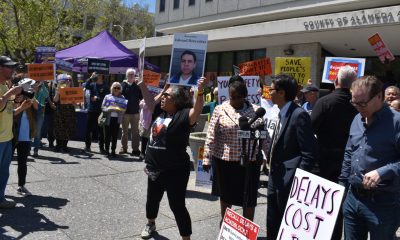Featured
Jack London’s 140th Birthday Reminds Oaklanders of His Roots With His Black “Mother” Jennie Prentiss and the First AME Church
Author Jack London’s Black roots were celebrated during his birthday party in Jack London Square by the performers who presented the Post newspaper front-page tribute to Jack London and Jennie Prentiss.
<p>
Jennie was a Black woman who saved Jack London’s life at birth, breast-fed him, gave him the name Jack (which was originally John); lent Jack money when he was broke and helped him become the first American author to make a million dollars.
He never forgot his Black roots or his original Black investor who bankrolled his career. He lived in Jennie Prentiss’s house and attended the First African Methodist Episcopal Church at 15th and Market Streets with her as his “mother.”
Jack donated more than $15,000 to the First African American Methodist Church.
Some people claim Jack London was a “bigot” because of a highly publicized turn-of-the-century boxing match between Jack Johnson and Jim Jefferies in Reno, Nevada. London had been hired to write for the loser known as the “The Great White Hope.”
By growing up in a Black family household, Jack often fought racist whites and his classmates who called him a “N—-lover,” which caused him to use fisticuffs as a means of “defensive violence” early in life.
He also devised other survival strategies: taking alternate routes to Jennie’s house or just walking past her house until the bullies were out of sight, allowing him to double back home safely.
Jack dreamed of becoming an oyster pirate on the San Francisco Bay. And to fulfill this dream, he turned again to Jennie Prentiss for financial assistance.
He wrote: “So I interviewed my Mammy Jennie, my old nurse at whose black breast I had sucked. She was nursing sick people at a good weekly wage. Would she lend her ‘white child’ the money? Would she? What she had was mine.”
London was right, because Mrs. Prentiss gave Jack $300 in twenty-dollar gold pieces with which to buy a secondhand sloop called the Razzle Dazzle from an oyster pirate named French Frank. On May 11, 1903, London signed a copy of his book “The God of his Fathers and Other Stories” (1901) for Prentiss. This inscription reads:
“To Dear Mammy Prentiss
With best Love from one
Who loves you well.
Your son,
Jack”
In 1906, Jack purchased a home for Jennie Prentiss located at 490 – 27th St. in Oakland. She was 74 years of age and she became a well-known figure within the Bay Area’s African American community, both as a midwife and community leader in various organizations, such as the Federated Negro Woman’s Club, which hosted such luminaries as Booker T. Washington.
Jack London’s last will and testament, signed in 1911, memorialized his love for Jennie Prentiss by providing her with an income for life and money for her funeral expenses.
Jennie Prentiss died in Oakland on Nov. 27, 1922.
The Post plans to re-release the series involving Jack London and Jennie Prentiss in upcoming issues during the Black History and Women’s History month’s editions.
Added festivities are planned this month for Jack London by Anna Lee Allen of the Oakland Tribune, The Oakland Post and the Oakland Heritage Alliance.
Activism
Oakland Post: Week of May 21 – 27, 2025
The printed Weekly Edition of the Oakland Post: Week of May 21 – 27, 2025

To enlarge your view of this issue, use the slider, magnifying glass icon or full page icon in the lower right corner of the browser window.
#NNPA BlackPress
Remembering George Floyd
#NNPA BlackPress
OP-ED: Oregon Bill Threatens the Future of Black Owned Newspapers and Community Journalism
BLACKPRESSUSA NEWSWIRE — Nearly half of Oregon’s media outlets are now owned by national conglomerates with no lasting investment in local communities. According to an OPB analysis, Oregon has lost more than 90 news jobs (and counting) in the past five years. These were reporters, editors and photographers covering school boards, investigating corruption and telling community stories, until their jobs were cut by out-of-state corporations.

By Dr. Benjamin F. Chavis, Jr.
President and CEO, National Newspaper Publishers Association
For decades, The Skanner newspaper in Portland, the Portland Observer, and the Portland Medium have served Portland, Oregon’s Black community and others with a vital purpose: to inform, uplift and empower. But legislation now moving through the Oregon Legislature threatens these community news institutions—and others like them.
As President and CEO of the National Newspaper Publishers Association (NNPA), which represents more than 255 Black-owned media outlets across the United States—including historic publications like The Skanner, Portland Observer, and the Portland Medium—l believe that some Oregon lawmakers would do more harm than good for local journalism and community-owned publications they are hoping to protect.
Oregon Senate Bill 686 would require large digital platforms such as Google and Meta to pay for linking to news content. The goal is to bring desperately needed support to local newsrooms. However, the approach, while well-intentioned, puts smaller, community-based publications at a future severe financial risk.
We need to ask – will these payments paid by tech companies benefit the journalists and outlets that need them most? Nearly half of Oregon’s media outlets are now owned by national conglomerates with no lasting investment in local communities. According to an OPB analysis, Oregon has lost more than 90 news jobs (and counting) in the past five years. These were reporters, editors, and photographers covering school boards, investigating corruption, and telling community stories, until their jobs were cut by out-of-state corporations.
Legislation that sends money to these national conglomerate owners—without the right safeguards to protect independent and community-based outlets—rewards the forces that caused this inequitable crisis in the first place. A just and inclusive policy must guarantee that support flows to the front lines of local journalism and not to the boardrooms of large national media corporations.
The Black Press exists to fill in the gaps left by larger newsrooms. Our reporters are trusted messengers. Our outlets serve as forums for civic engagement, accountability and cultural pride. We also increasingly rely on our digital platforms to reach our audiences, especially younger generations—where they are.
We are fervently asking Oregon lawmakers to take a step back and engage in meaningful dialogue with those most affected: community publishers, small and independent outlets and the readers we serve. The Skanner, The Portland Observer, and The Portland Medium do not have national corporate parents or large investors. And they, like many smaller, community-trusted outlets, rely on traffic from search engines and social media to boost advertising revenue, drive subscriptions, and raise awareness.
Let’s work together to build a better future for Black-owned newspapers and community journalism that is fair, local,l and representative of all Oregonians.
Dr. Benjamin F. Chavis Jr., President & CEO, National Newspaper Publishers Association
-

 #NNPA BlackPress3 weeks ago
#NNPA BlackPress3 weeks agoMLK Bust Quietly Removed from Oval Office Under Trump
-

 Activism4 weeks ago
Activism4 weeks agoOakland Post: Week of April 30 – May 6, 2025
-

 Activism3 weeks ago
Activism3 weeks agoOakland Post: Week of May 7 – 13, 2025
-

 Activism2 weeks ago
Activism2 weeks agoNew Oakland Moving Forward
-

 #NNPA BlackPress3 weeks ago
#NNPA BlackPress3 weeks agoTrump Abruptly Fires First Carla Hayden: The First Black Woman to Serve as Librarian of Congress
-

 Activism2 weeks ago
Activism2 weeks agoAfter Two Decades, Oakland Unified Will Finally Regain Local Control
-

 Activism2 weeks ago
Activism2 weeks agoOakland Post: Week of May 14 – 20, 2025
-

 Alameda County2 weeks ago
Alameda County2 weeks agoOakland Begins Month-Long Closure on Largest Homeless Encampment

























































